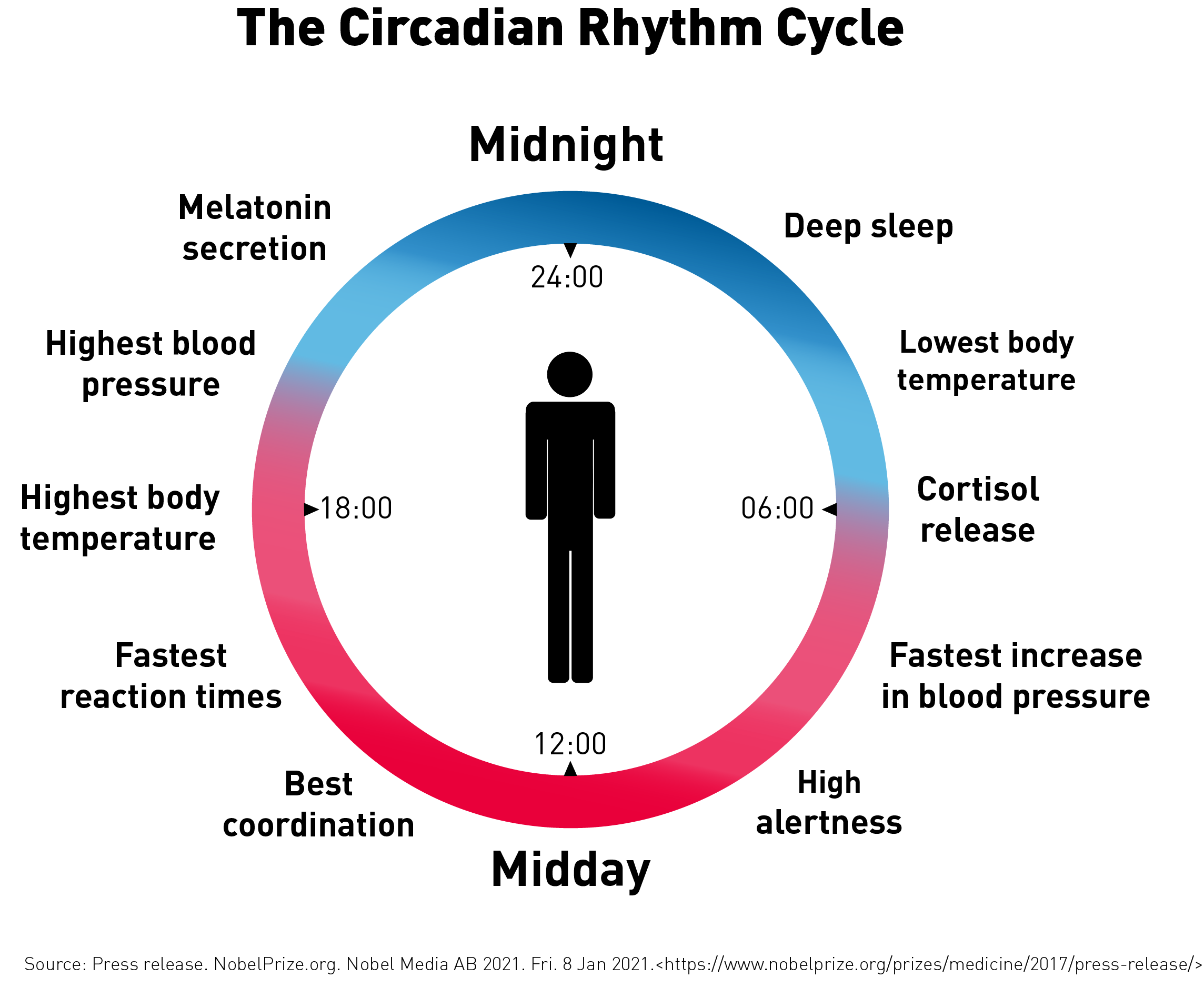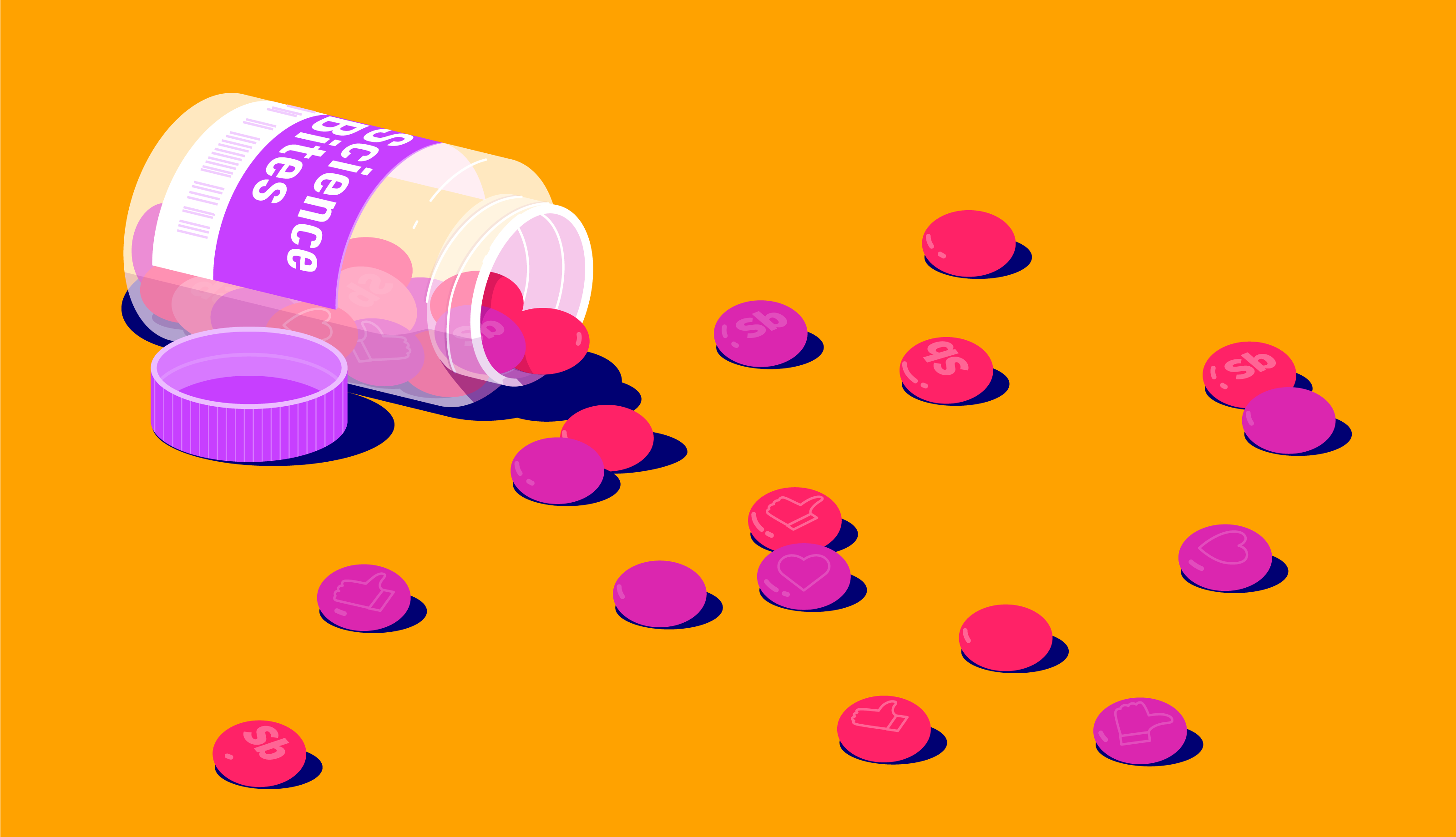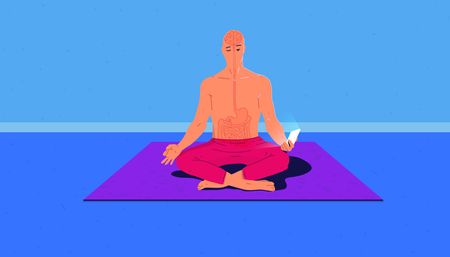Humans have clock genes that make the body tick like a well-oiled machine. Learn about your circadian rhythm and how it affects your health and disease risks.
A circadian rhythm is a 24-hour biological clock that affects your sleep, digestion, and metabolism. When your circadian rhythm is disrupted, it can even increase your disease risks.
The circadian rhythm is a body clock that organises all the biological processes necessary for life. It is dictated by clock genes that trigger essential metabolic activities, like storing energy, transporting oxygen, getting rid of waste, and releasing hormones and neurotransmitters.
Table of contents
- What is a circadian rhythm?
- How the circadian cycle works
- Do you need to reset your body clock?
- Circadian rhythm and health
- How to fix your sleep schedule
Even though you can’t see or feel this clock, circadian health is essential for your health and wellbeing. In this article, you’ll discover what happens when the cycle rhythm is disrupted, how to reset your body clock, and how to fix your sleep schedule.
What is a circadian rhythm?
The circadian rhythm is a 24-hour clock that dictates millions of invisible metabolic processes that keep the body alive. It determines digestive rhythms, fat burning and fat storage, sleeping patterns, and much more. This biological rhythm is run by clock genes that signal when each process should take place.
Going to bed late, playing with your phone at midnight, eating late in the evening, and working night shifts are all factors that can shift your circadian cycle. Scientific evidence now indicates that circadian rhythm disruptions are associated with serious, but preventable, chronic diseases like diabetes type II, heart disease, obesity, stroke, and cancers.
How the circadian cycle works

The circadian rhythm is made up of a set of clocks and a central “master clock”, called the suprachiasmatic nucleus (SCN). The SCN is located in the hypothalamus, the part of the brain responsible for regulating stress, reproduction, and growth hormones. It also indirectly impacts sleep hormones.
The body’s clock contains about 20,000 cells, which are located just above the intersection of the optic nerves. The cycle rhythm is set by signals from special melanopsin cells in the retina in response to light exposure. Blue light (from bright daylight, phone screens, and TVs) has the strongest effect on melanopsin receptors, followed by green and red light.
Interestingly, studies show that blind mice and blind people still have active melanopsin receptors that regulate their biological clock. This helps to explain why patients suffering from blindness can “sense” light, even if they can’t see it.
☝Find out more about your genes☝ Take the Atlas DNA Test to explore how your genetic make-up affects your health and wellbeing.
Do you need a body clock reset?
Sleeping at irregular times, using devices, eating late at night, and other pernicious habits displace the cycle rhythm. When a person’s biological cycle isn’t on schedule, it causes a wide range of minor health issues that can affect everyday life.
Low energy, mood swings, food cravings, weak immunity, and having trouble losing weight are common side effects of circadian disruption according to Professor Satchidananda Panda, author of the Circadian Code.
| Area | Common problems |
|---|---|
| Sleep | Difficulty falling or staying asleep, sleeping too much |
| Weight | Weight gain, inability to lose weight |
| Vitality | Low energy, reliance on caffeinated products |
| Diet | Late-night food cravings, stomach cramps & indigestion |
| Mood | Depression, emotional outbursts & irrational anger |
| Immunity | Weak immune system, frequent illness & infections |
Circadian rhythm and digestion
The digestive system secretes the most gastric juices, enzymes, and hormones in the first half of the day. This activity reduces as the afternoon progresses into evening. These molecules are all essential for healthy digestion, which is why eating late at night can cause indigestion.
Circadian rhythm and sleep

At night, the circadian rhythm is focused on putting the body to sleep, removing waste products, and repairing tissues from the wear-and-tear of daytime activities. In fact, sleep is the only time for the brain to remove the waste products of chemical reactions.
When you mess with your sleep schedule, or deprive yourself of sleep, you impair the brain’s ability to operate at maximum efficiency.
Circadian rhythm and disease
Living out of sync with the body’s circadian rhythm over the short and long term is associated with serious, chronic, and preventable diseases that affect the body’s metabolism, according to a 2016 systematic review on the “Interaction between circadian rhythms and stress”.
The study’s summary of its effects on night shift workers demonstrated that such professionals have “a higher incidence of obesity, diabetes type II and related metabolic disturbances along with hypertension (high blood pressure), coronary heart disease, and ischemic stroke”.
How to fix your sleep schedule
Light and darkness are the main determinants in circadian rhythm. When daylight or screen light is detected by your eyes, it sends signals to the suprachiasmatic nucleus, which regulates all the clock genes in your body.
To reset your body clock, you need to put yourself on a schedule that respects your body’s metabolic rhythm. While this may be impossible for night shift workers, it is an achievable goal for people with day jobs.
- Go to bed and get up at the same time every day.
- Turn off TV screens, phones, and tablets 1-2 hours before bed.
- Eat your biggest meal early in the day when digestive juices are highest.
- Stay away from caffeinated beverages in the afternoon and evening.
- Cut down on alcohol at night because it affects sleep quality.
- Stop eating at least 3 hours before bed to avoid indigestion.
- Get blackout curtains and dim light bulbs for your bedroom.
- [Sachin Panda, The Circadian Code]
- Koch C.E. et al., Interaction between Circadian Rhythm and Stress 2017
- S. Panda et al., Coordinated Transcription of Key Pathways in the Mouse by the Circadian Clock
- Blue light has a dark side
- Circadian rhythms fact sheet
- Thomas C. Erren et al., Shift Work and Cancer 2010
- Bennett J.E. et al. (2018). NCD Countdown 2030: worldwide trends in non-communicable disease mortality and progress towards Sustainable Development Goal target 3.4
- NHS Prevalence, Achievements and Exceptions workbooks 2016




















